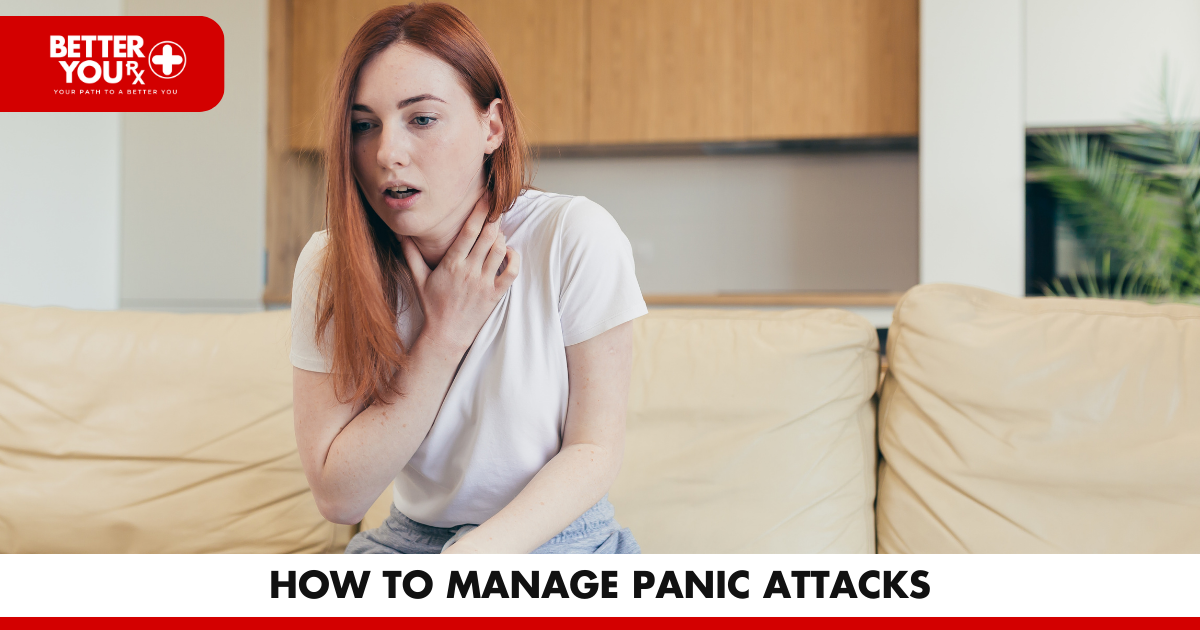Panic attacks affect around 11% of people in the U.S. annually, with nearly 3% experiencing chronic panic disorder. When faced with symptoms like chest tightness, racing heart, trembling, numbness, or detachment, those who have gone through panic attacks often fear their recurrence. Learning how to handle panic attacks and understanding available panic disorder treatments can alleviate anxiety and minimize future episodes.
Unraveling Panic Attack Causes
The exact cause of panic attacks remains elusive, although predisposition to anxiety heightens their likelihood. Genetics, stress, temperament, and brain changes are thought to contribute to vulnerability. While there’s no genuine threat, these factors may trigger the body into fight or flight mode.
Short-Term Strategies for Panic Attacks
Effective tactics to prevent and manage panic attack symptoms exist. Since not all methods suit everyone, experimentation with various techniques or their combination may be necessary for optimal outcomes.
Identify the Situation
Intense fear often accompanies panic attacks, fostering feelings of impending doom or death. Acknowledging the panic attack and reassuring yourself of safety in the moment might relax your body and alleviate symptoms. Utilize phrases like:
- This feeling is unsettling, yet I’m secure.
- It’s panic, not a heart attack.
- I’ll overcome this.
- This is temporary; it’ll pass. Writing down these phrases or having loved ones reinforce them can be helpful.
Alter Temperature
Swift temperature shifts could halt panic attacks for some. Applying an ice pack, stepping outside, or immersing in a warm or cool bath might prove beneficial.
Focus on the Present
Distracting yourself from panic attack symptoms can mitigate or stop them. Engage your senses:
- Identify colors and objects around you.
- Count sounds you hear.
- Recognize smells.
- Tune into tactile sensations.
- Move body parts and focus on how they feel.
Deep Breathing
Slowing down breath during a panic attack can calm the nervous system and alleviate symptoms. Box breathing—inhaling, holding, exhaling, and pausing for four seconds each—can be effective.
Remember that while deep breathing helps most, it might worsen symptoms for others. Alternative strategies should be prioritized in such cases.
Long-Term Panic Disorder Treatment
Panic disorder diagnosis often follows frequent panic attacks and persistent fear of their recurrence. To manage panic attacks’ frequency and intensity, options include treatments and lifestyle modifications.
Medications Prescribed medications include:
- SSRIs: Boosting serotonin levels, these antidepressants can reduce panic attacks (e.g., fluoxetine, paroxetine).
- SNRIs: Enhancing serotonin and norepinephrine levels, these antidepressants can help (e.g., venlafaxine).
- Benzodiazepines: Slowing the central nervous system, these anti-anxiety drugs can ease symptoms (e.g., alprazolam, lorazepam)
Potential side effects accompany all medications. Given benzodiazepine addiction risks, alternative drugs may be preferred initially.
Psychotherapy
Understanding panic attack origins and discussing emotions can enhance coping and reduce attack frequency. Psychotherapy, like cognitive-behavioral therapy (CBT), helps recognize panic attack symptoms’ onset and manage them through constructive thinking. CBT identifies stress sources and anxiety triggers, aiding in their resolution. Trauma-related panic attacks might benefit from therapies like EMDR.
Exercise
Regular aerobic exercise, such as walking or swimming, can alleviate anxiety and reduce panic attacks. Studies indicate exercise’s positive impact on symptoms of anxiety and panic disorders.
Minimize Stimulants
Stimulants like caffeine can exacerbate panic attacks in some cases. Cutting back on caffeine intake from sources like coffee, tea, energy drinks, and chocolate could decrease panic attack frequency and intensity.
The initial step in addressing panic attacks is seeking help. If panic attacks hinder daily life, reaching out to healthcare professionals is vital. Communicate any escalation in frequency or intensity. Professionals can discuss treatment options and offer lifestyle advice for improved mental health.
Connect with us effortlessly through a multitude of channels, including our user-friendly website: https://betteryourx.com/. Have questions or concerns? Dial 1-888-594-3708 to converse with us directly or drop us an email at info@betteryourx.com. Our operational hours extend to serve you zealously, Monday through Friday from 9:00 to 20:00, and on Saturdays from 11:00 to 15:00. Remarkably, we are at your service throughout the year, even on holidays, dedicated to delivering you the finest online medicinal solutions. Elevate your well-being with Better You Rx today!



